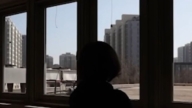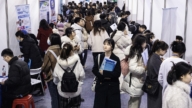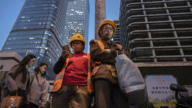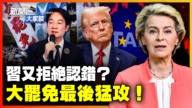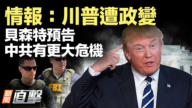【新唐人2011年12月28日讯】以出口为导向的中国经济,由于通货膨胀和房地产泡沫的破灭,加上世界经济形势影响,迫使中共不断喊出“扩大内需”的口号。外媒指出,中国“扩大内需”首先应从减税开始。
12月26号,《路透社》发表“中国扩大内需应减税先行” 文章。文章认为,“降低增值税名义税率,同时取消各种税收优惠,对扩大内需,提振消费更具长期性﹔而将商品的价内税改为价外税,引导产业结构调整或许会有意想不到的功效。”
据中国财政部资料显示,1-9月全国税收总收入完成71,292.18亿元人民币,同比增长27.4%。增值税、营业税、企业所得税和个人所得税,同比分别增长了18.7%、24.0%、35.8%和34.4%。
但是,另一面,私人消费在中国国内生产总值(GDP)中的比重,在过去十年从45%降到现在的33%。相比之下,在大多数经济体,包括中国的一些东亚邻国,私人消费占到GDP的50%左右,个人消费在美国GDP中的比重高达70%。
“美国耶鲁大学”管理学院金融学教授陈志武认为,中国国有资产几乎占了国家生产性财富的四分之三,在过去30年里,资产价值增长的大部分都进了国库。对大部分公民而言,工资增长的速度远远慢于国内生产总值。难怪国内消费不能随GDP相应增长。
陈志武指出:不能还赋予民,不能将财政盈余通过减税和退税转给家庭,那么,政府以投资为基础的刺激计划,至多只能短暂的促进经济增长。
可是,中国税负之高,不仅严重影响居民的生活水准,还影响了企业发展。
日前,中共中央党校国际战略研究所副所长周天勇在论坛上表示,在增值税率不降低、小型企业的税收不降的情况下,如果加强现在的手段法制化的话,对一些民营制造业、小型企业,包括一些服务业,是一个很严重的打击,90%的企业不偷税、漏税肯定会倒闭。
不过,知名财经评论家叶檀认为,税改如果不能突破最大的既得利益阶层——各级权力部门的阻力,就难进一步往前。她指出,近十年财政收入大幅增长,主要缘于两大原因:政府从公共服务型政府向投资型政府转型﹔公务员队伍越来越庞大。要减税负,降低公务员数量是基本前提。
但叶檀对减税并不乐观。英国《金融时报》转载了叶檀的评论,文章指出,到现在为止,没有手段阻止市场权力部门的无度扩张。而地方政府、权力部门受不到社会舆论监督,必然无度膨胀。
但《路透社》文章透露:中共一直隐瞒消费者现行的价内税政策。
国家信息中心信息资源开发部主任徐长明以汽车举例,“比如100万元的车,4公升以上的发动机排量的车有消费税40%,现在这个税是在价内征收,消费者不知道交40万的税。厂家知道,国家知道,但是消费者不知道。如果改成价外税,很多人可能就不买了。”
经济时政评论家草庵指出:中共政府一直强调所谓的“效率优先兼顾公平政策”,就是中共政府还是以维护少数人的利益,而不是以公平为主。所以,只有让中共下台,解决中共这个独裁政权,中国百姓才能够生活在一个幸福、和平、安定的环境。
新唐人记者宋风、王明宇综合报导。
Foreign Media: Tax Cuts First if China Expanding Domestic Demand
Being an export-oriented economy country, China is affected by
their inflation and real estate crisis as well as the global recessions.
The Chinese Communist Party (CCP) continues to call for
“expansion of domestic demand.”
Foreign media said that China’s “expanding domestic demand”
should start with tax cuts.
On Dec. 26th, Reuters published an article entitled China
expanding domestic demand should be tax cut first.
It said that lowering VAT rates and cancelling various tax
incentives the consumption boost and
expansion of domestic demand will be more long-term.
To modify goods’ that already have tax included in price to
goods’ tax excluded from the price could achieve an unexpected effect for the industrial structure.
Chinese Ministry of Finance data shows that from January
to September,
total tax revenue is 7.1 billion yuan (US$1.12 billion),
an increase of 27.4% year-to-year.
The VAT increased 18.7%, turnover tax increased 24%, and
corporate income tax increased 35.8%.
However, on the other side, personal consumption in GDP
reduced during the past decade from 45% to today’s’ 33%.
In the most countries, including
China’s East Asian border countries,
private consumption accounted for 50% of GDP,
US’s private consumption is up to 70% of GDP.
Chen Zhiwu, a professor at Yale University, school of
Management Finace, believes that China State-owned assets accounted for 3/4 of state productive wealth.
In the past 30 years, most of the growth of assets value
goes into treasury.
For the public, pay raises are far slower than GDP’s growth.
That’s why the domestic consumption can not grow together with GDP.
Chen pointed out that without returning wealth to the people,
without giving back the fiscal surplus to families through the tax cuts and tax return,
the government’s stimulation via an investment-based plan
would only have short-term economic growth.
However, China’s high tax not only affects living standards,
but also affects development of businesses.
Recently, the CCP Central Party School official,
Zhou Tianyong said that without reducing the VAT rate,
without reduction of business tax as a precursor to
strengthening the existing legal system,
it will be a disaster for private companies, and small businesses,
including service industries.
Right now, without tax evasion, 90% businesses would be bankrupt.
However, financial commentator Ye Tan believes that if tax
reform can not reach the ruling class, it can hardly move forward.
Ye Tan points out that in the past ten years, fiscal revenue
has increased rapidly, for two reasons:
first, the government transfer from public service sector to
investment sector; second, the civil service grew.
To cut tax and lay off the civil employees is essential.
Ye Tan doesn’t feel optimistic about tax cuts.
Financial Times published Ye Tan’s comments stating that
at present, no power to prevent the market power’s expansion.
The local authorities’ power is not monitored by the public,
resulting in an inevitable power expansion.
Reuters revealed that the CCP still has concealed
consumer’s tax included in price policy.
State Information Centre official, Xu Changming, takes cars
as an example: “Such as 1 million cars with 4 litres engine, you have to pay a 40% car tax,
this tax is included in the price, the consumers
don’t know what they have paid.
The factory knows and the state knows.
If the tax changed excluded in price, consumers may decide not purchase the car.
Economist commenter, Caoan Jushi said that the CCP regime
emphasised the so-called “Efficiency is the priority meanwhile considering equal policy.”
This means the CCP is to protect minorities’ interests,
rather than put equality as a basic principle.
Thus if the CCP steps down, the dictatorship will be eliminated,
and Chinese people can live in a happy, peaceful and stable environment.
NTD reporters Song Feng and Wang Mingyu


